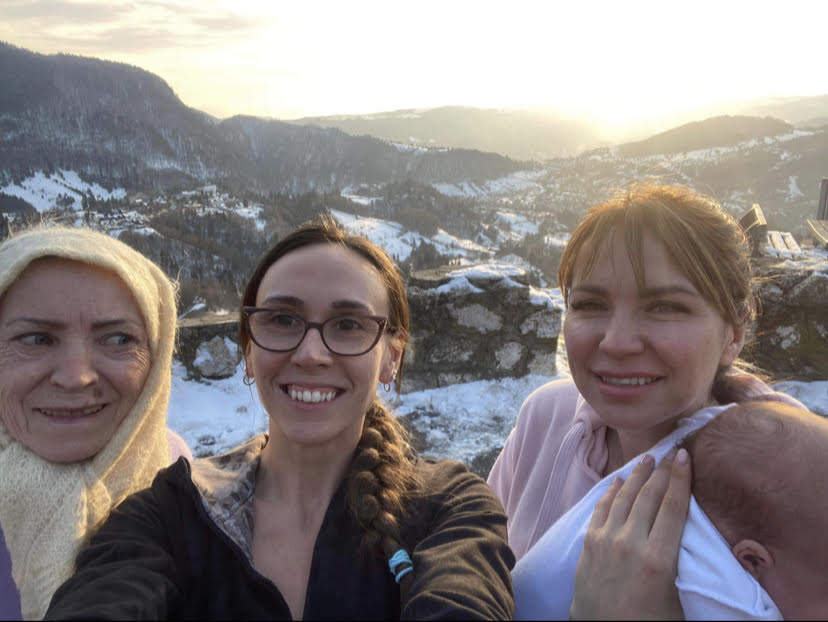Claire Guzanova, a resident of Belmont, Ont., worked for over two months to bring her extended family home to Canada from Ukraine, a process that took considerably longer than she expected.

Now the family, among other Ukrainians, are seeking answers from the federal government as to why their visa applications were delayed.
On March 14, Guzanova started her journey to meet her distant Ukrainian family in Romania, with the goal of bringing them home to safety in Canada. This included her mother-in-law Nina Huzanova, sister-in-law Lidiia Sazhko, two-month-old nephew Timur Sazhko and long-time friend Svitlana Cherepanova.
Born in London, Ont., Guzanova is a legal administrative assistant at Only Immigration, a law firm focused on Canadian immigration, citizenship and refugee law.
With her help, Guzanova’s extended family worked under the Canada-Ukraine Authorization for Emergency Travel (CUAET), available to all Ukrainian nationals and their families to stay in Canada for up to two years.
“This is not a refugee program,” said Aidan Strickland, press secretary for Immigration, Refugees and Citizenship Canada (IRCC). “Ukrainians have indicated that they need temporary safe harbour, and many of them intend to return to their home country when it will be safe to do so.
“We are working around the clock to help Ukrainians and their families get to Canada as quickly and as safely as possible.”
- What is a halal mortgage? How interest-free home financing works in Canada
- Capital gains changes are ‘really fair,’ Freeland says, as doctors cry foul
- Ontario doctors offer solutions to help address shortage of family physicians
- Canada will take bigger economic hit than U.S. if Trump wins election: report
However, Guzanova said “the Visa Application Centre (VAC) did not do a good job of providing the instructions for these single-entry travel documents.”
“The lack of communication between them and other additional parties left so much frustration for those people who didn’t have passports, like my sister-in-law and nephew,” she added.
Guzanova said that by April 5, all her mother-in-law and friend’s documents for the CUAET were in order and ready for use because they had international passports.
“But it took me over another month to get these single-entry travel documents for my sister-in-law and her son, who did not have passports,” she said.
According to Strickland, “all visa applications and biometric appointments for Ukrainian nationals and their family members are being prioritized.”
She noted that the IRCC is taking a “risk-based” approach to biometric screening, having the three following cohorts exempt from the requirement:
- Applicants 17 years old or younger.
- Applicants 61 years old or older.
- Applicants who were previously approved for a Canadian visa in the past 10 years.
“IRCC is also waiving the $85 biometric collection fee for visa applications submitted by individuals and families eligible for the CUAET,” Strickland added.
Through IRCC, VFS Global stands as the company managing Canada’s visa application system.
“Several countries have this VAC take care of some portions of their visa applications,” said Guzanova.
She said that after sending her sister-in-law and nephew’s applications through the Canadian Embassy to VFS Global, the embassy no longer had control over them or where they went.
“This visa centre is not under Canadian jurisdiction, it’s just a third-party service,” Guzanova explained. “But through it all, we were still getting conflicting information.”
IRCC, in collaboration with Global Affairs Canada, opened the Canadian Biometric Operations Centre (CBOC) in Warsaw, Poland on April 19.
The goal is to allow for an additional 9,000 to 12,000 biometric enrolments per week in Poland, with greater capacity in the longer term should there be ongoing demand, according to Strickland.
She said the CBOC will be staffed with IRCC personnel on temporary assignment in the short term.
“This facility will be able to process between 1,500 and 3,000 biometrics per day,” said Strickland. “This facility will position IRCC to rapidly eliminate the current inventory, respond to a potential second wave of applications, and provide reliable service to clients.”
However, Guzanova mentioned the displeasing or “lack of” customer service and support in answering various questions or acquiring extra assistance during their application process.
“They talked down to us,” she said. “They used very condescending, belittling language and there was nothing anybody could do about that because there’s no one to complain to.”
Guzanova also raised concerns about the lack of published guidance online in ensuring proper filing of required documents for Ukrainian refugees in qualifying for CUAET.
She said that her family was not informed if and when their document packages were filed incorrectly, which slowed down their application process without their knowledge.
“All the instructions that you could find on their website are still for people who have passports,” she said. “But the (Canadian) Embassy told us that if you’d don’t have a passport, everything’s the same.”
According to Guzanova, this was a prime example of miscommunication between multiple parties involved.
“We were told that instead of a passport, we could send photos,” she said. “It wasn’t clarified that the VAC also wanted some kind of identity document submitted instead of the passport, not just photos.”
“So, the VAC is receiving what they consider as an incomplete package of documents, and they’re just not doing anything with it because it’s incomplete,” Guzanova added. “They’re not communicating with applicants and applicants are thinking that their documents are being processed. They’re just being told by IRCC that they have to wait while the VAC is actually doing nothing.”
Guzanova said that when trying to reach either the VAC or the IRCC through the provided help email, her questions continued to remain unanswered.
“After two weeks went by, they finally answered my email but said, ‘If this is still a problem, email us again,’ and completely skipped over my questions,” she said. “So, I emailed back and again, two weeks go by, and they gave me the same response.”
According to Strickland, IRCC has received more than 250,000 applications from Ukrainian nationals between March 17 and May 25 and has since approved over 120,000 applications.
She said IRCC has also seen more than 35,000 Ukrainian nationals arrive in Canada since Jan. 1.
“We are closely monitoring the operational capacity of IRCC’s offices and VACs in Europe and have deployed additional staff, supplies and equipment to the region,” said Strickland. “We are also setting up additional biometrics collection locations and are increasing capacity at existing VACs.”
Strickland said additional biometric capacity has been added to the VAC network and Canadian missions in Poland, Austria, Romania and Germany.
IRCC has also opened new temporary VACs for biometric collection in Warsaw, Poland and Bratislava, Slovakia, and additional locations are scheduled to open soon in Budapest, Hungary and Krakow, Poland.
Despite that, Guzanova said that some Ukrainian refugees, including her family, are still reporting additional concerns and delays within airports after receiving their required documents, particularly those using one-way travel documents in lieu of a passport.
“We got there four hours before our flight home and made it to the gate less than five minutes before the doors closed,” she said. “Even with the acquired travel documents, they were still asking for a passport and I was beyond panicking.”
Despite the immense number of delays and application issues, Guzanova and her extended family made their flight and she couldn’t believe they were going home.
“I couldn’t believe that I was sitting on that plane,” she said. “That’s kind of when it hit me like, wow, I’m really going home now.”
While originally from London, Guzanova first moved to Ukraine in 2010 while still attending Western University.
“We lived there for almost five years,” said Guzanova. “I had my first daughter there, but things got bad in 2013 and then progressively worse.”
During that time, Ukraine faced one of the greatest threats to its national security since the collapse of the Soviet Union.
It is known as the Ukraine Revolution of Dignity, described as a transformation of Ukrainian society as protests were sparked by the pro-Russian President Viktor Yanukovych to sign an association agreement with the European Union (EU).
For months, protesters clashed with security forces across the country.
Various solidarity and support campaigns for Ukrainian protesters were held in more than 20 countries, including Canada, the U.S., Great Britain and Germany.
In 2014, Russia annexed Crimea and, according to Guzanova, Ukraine felt powerless to reclaim it.
“In early 2015, when there were discussions that the border was going to close to military-aged men, we wanted to get out before that went into effect and now, seven years later, we’re still here,” she said.
Now back in Canada for the second time around, Guzanova reflected on their recent journey and commented on the war that continues to turn buildings to rubble in the country she once called home.
“What’s continuing to happen in Ukraine is heartbreaking,” she said. “As much as this chapter is coming to a close for us in terms of the documentation side of things, nothing is resolved yet. There are still a lot of broken families where the men are not allowed to leave, and the women and children are trying to seek safety.
“This is far from finished.”










Comments